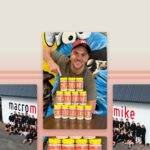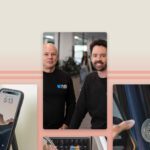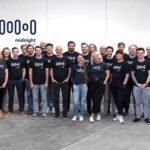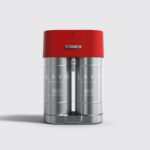M&A on the rise & the EV SPAC demise

Welcome to Ignition Lane’s Wrap, where they cut through the noise to bring you their favourite insights from the technology and startup world. You can subscribe for free today.
Broadcom is set to acquire VMware in a mega US$61bn deal – one of the largest tech deals ever.
The deal extends Broadcom’s diversification into the enterprise software space (Broadcom has historically focused on semiconductors). According to Gartner, VMware held a 72% market share of the global virtualisation market in 2021, with revenue of US$5.9bn.
If successful, the deal will close in Jan 2023. In the meantime, VMware’s President Sumit Dhawan has been busy trying to reassure its 35,000 employees that Broadcom won’t axe thousands of jobs or destroy customer experience, as happened with its acquisition of Symantec and CA Technologies:
“Listen, the customer reputation of Broadcom can be negative and also the team members and the actions they have taken in the past with their software businesses have impacted the employees”
Cool, cool. Post-acquisition success hinges on cultural alignment (or respect, at the very least). Sounds like this merger will go well…
The best things (don’t) come to those who wait. In February Zendesk declined a US$17bn takeover offer. The customer service software firm has been looking for a buyer ever since. This week it finally agreed to be acquired by a group of buyout firms led by Hellman & Friedman and Permira. The price tag? A measly US$10bn. Whoops.
Expect to see a record number acquisitions of VC-backed companies in 2022. With VC wallets tightening and public markets cooling, cashed-up tech companies will be well placed to snap up products and teams via M&A. TechCrunch reports that transactions are already getting smaller and more frequent.
Security is secure. According to a recent Morgan Stanley CIO survey, security software is the least likely to receive a budget cut during a downturn (collaboration software and on-prem spending areas were the most likely). In fact, prominent cybersecurity vendors such as CrowdStrike and Okta are so confident that the sector will remain unscathed that they raised revenue guidance this month. But it won’t be easy for everyone. With 3,500+ security vendors in the U.S. alone, competition for CIO/CISO attention is fierce.
Buckle up for the EV SPAC wreck. 2020-21 saw a spate of electric vehicle SPACs. The majority these companies have since been subject to federal investigations. Share prices tanked. Execs resigned. Now, just a year after going public at a $1.4bn valuation, U.S. EV maker Electric Last Mile Solutions (ELMS) is the first to file for bankruptcy. More to come.
Shark planes & honey-free bees
Fresh local (mostly) biotech happenings
Bee fabric. NZ-based Humble Bee Bio is developing a biodegradable alternative to plastics by synthesising the biology of the Australian masked bee. The bee doesn’t make honey. Instead it makes a nesting material for its larvae with plastic-like properties. Humble Bee Bio has extracted the genetic code from the bee and is now trying to recreate the material in the lab.
Cell-ebrate. Researchers at the University of Technology Sydney have developed a cheaper, less labour intensive way to harvest stem cells using a 3D printed system from bioreactors. By replacing damaged cells, stem cells could treat arthritis, diabetes, and potentially even cancer.
Glide like a shark. MicroTau is producing microscopic 3D printed shark scale-inspired stickers that can to be applied to aircraft to reduce drag by as much as 12%, potentially saving the aviation industry billions a year in fuel costs.
Sense like a shark. eo is developing a wearable device that can measure a swimmer’s effectiveness and technique, including stroke force in up to six directions. Olympic swimmer Kyle Chalmers is using the SwimBETTER product in preparation for the Paris Olympics.
Fitbit for dogs. You heard it here first. Melbourne-based ilume has created a dog collar that tracks its activities and interacts with a food bowl – telling owners how much food their dog should eat.
Benjamin Button. Not local news but interesting: Saudi Arabia plans to spend US$1bn a year discovering treatments to slow ageing. The first cab off the rank might be diabetes drug metformin.
Related: Lifespan with Dr. David Sinclair (an Australian biologist who is a professor of genetics at Harvard) is a great podcast on ageing.
Canva the disruptor, MCB the influencer
Local list-related things
Changing a changing world. Canva ranked 4th on CNBC’s tenth annual Disruptor 50 list. The 2022 list looks a little different to last year’s, which had a heavy focus on tech companies thriving in lockdown (share trading platform Robinhood, online payments platform Stripe, and social platform Discord took out the top 3 spots). What’s hot in 2022? Certainly not share trading. Eeep. Climbing the disrupter ranks this year are tech companies solving logistics, healthcare and climate challenges.
NZ startup boom. A list of the best NZ tech firms and startups to work for has doubled to 100 since last year, reflecting solid growth in the local ecosystem. Some of the NZ startups taking on the world include:
- Alimetry, which was recently granted FDA approval for a wearable device that helps diagnose gastric disorders non-invasively.
- Auror, a retail crime intelligence platform used by 90% of the NZ retail market, 40% of the AU market and US behemoth Walmart. Auror expanded its patch into the UK this month.
- Halter, revolutionising farming starting with fenceless cow paddocks.
- Kami, a digital classroom tool used by over 30 million users. Earlier this year Kami made Time’s 100 Most Influential Companies list.
Win friends and influential people. Atlassian co-founder and co-CEO Mike Cannon-Brookes made Time’s 100 Most Influential People. The only Aussie to make the list, MCB was praised for his investments in decarbonisation and recent corporate activism against AGL.
Speaking of Atlassian, it just turned 20! Reflecting on the milestone, MCB and Scott Farquhar shared 20 lessons on strategy, values, and building an enduring company.
Inventing the future. Nature released its Nature Index Annual Tables for 2022, which tracks author affiliations in research articles across 82 high-quality science journals – a proxy for who is producing the most, credible research. The 31 fastest-rising institutions were all Chinese. Australia (#10) and NZ’s (#31) overall contributions respectively dropped by 3.7% and 16.6% compared to 2021. Not surprising given ABS figures published last week show that Government R&D spend dropped significantly in the last (near) decade – just 0.17% of GDP in 2020-21, down from 0.24% in 2012-13.
Local venture news
May 2022 saw startup funding total $452m across 52 deals. Since then, corporate learning marketplace Go1 announced a whopping US$100m raise at a US$2b+ valuation.
Flying Fox Ventures pledged to give 5% of its carry (profit that fund managers keep when a company exits) to all of its portfolio company founders. So all founders will/should win, even if their startup fails. The shared carry proposition provides Flying Fox a solid differentiator in a fairly crowded early stage investor market.
The University of Melbourne created two investment funds to help it better commercialise research – a $15m pre-seed fund and a $100m fund for University-affiliated startups through to pre-IPO.
Blackbird’s second Aotearoa fund is taking shape, with the Accident Compensation Fund committing more than $10m and Elevate (the NZ government’s VC fund run by New Zealand Growth Capital Partners) committing $30m.
WinVC, a community and education program for women in VC, is being launched by OneVentures MD Dr Michelle Deaker, W23 MD Ingrid Maes and Jelix CEO Andrea Gardiner.
The NSW Govt is creating a $10m VC fund for women founders, named in honour of businesswoman Carla Zampatti.
A $100m Metaverse R&D Centre is being launched in Melbourne by the Thai T&B Media Global group and Two Bulls, an Australia-based specialist in gamification design.
Sydney-based Immutable launched a US$500m fund for web3 games and NFT-focused companies. Related: Australia Zoo dropped its first NFT collection. CRIKEY!
That’s a wrap! We hope you enjoyed it.
Bex, Gavin and the team at Ignition Lane
–
Gavin and Bex make it their business to know everything going on in technology, startups and venture capital.
Gavin is the Founder and CEO of Ignition Lane. He has 25 years of experience in the technology industry across startups, corporates and venture capital. Gavin was a founding Partner at venture capital firm Square Peg, an SVP of Product and Technology at Experian, and was one of the first employees and CTO at Hitwise – a venture-backed startup that was acquired for US$240m in 2007.
Bex is a founding Partner at Ignition Lane. Driven by curiosity, her career is the epitome of unconventional – spanning technology commercialisation and operations, corporate law, IT delivery and more. Applying this unique mix of skills and experience, she now works with CEOs and their teams to solve problems, drive growth and move beyond the status quo.



Related posts

Visionary Behind the Bionic Ear Honoured in 2024 Pause Awards Hall of Fame
3 December, 2024

Australia’s boldest innovators announced and new chapter for 2025
3 December, 2024

Top five winners score the most invaluable encounter
19 November, 2024

How Ally Watson is pioneering tech careers for women
15 November, 2024

Breakthrough Insights, Strategies, Creativity and Culture for now
12 November, 2024

Life lessons on ownership and how to keep creative control
6 November, 2024

How to unlock the intangible in brand equity with 4P’s
29 October, 2024

Discover trailblazing Finalists of Pause Awards 2024 in Australia
28 October, 2024

Why Bunnings feels like home: trust, community and genuine care
23 October, 2024

Why creativity and imagination will save the world
22 October, 2024

How Canva transformed a simple idea to become global leader
15 October, 2024

How NASA’s new AR tech will take astronauts to the next frontier
11 October, 2024

How to build authentic workplace culture
7 October, 2024

How to balance business growth with personal wealth
24 September, 2024

A time to dream big with Kristina Karlsson
16 September, 2024

The purpose of gatekeepers in authentic brand storytelling
6 September, 2024

It’s here, a final call to enter the Pause Awards this year
3 September, 2024

Join a free 7-week online learning on the go
3 September, 2024

Pause Awards partners with Ticker for exclusive broadcast coverage
6 August, 2024

Calling Melbourne — a significant player to enter!
6 August, 2024

Calling Hobart — an emerging hub to enter!
26 July, 2024

Calling Canberra — with most daring new ideas to enter!
16 July, 2024

Meet final judges and why they love Pause Awards
15 July, 2024

Meet even more judges and why they love Pause Awards
8 July, 2024

Meet more judges and why they love Pause Awards
5 July, 2024

Calling Adelaide — dynamic centre for innovation to enter
4 July, 2024

Meet the judges and why they love Pause Awards
1 July, 2024

Maybe those shouldn’t have been there in the first place
27 June, 2024

Calling Perth — an emerging innovator to enter!
25 June, 2024

Read a thrilling mid year predictions by the judges
24 June, 2024

Jasmine Batra’s Breakthrough Moment
24 June, 2024

WithYouWithMe’s Breakthrough Moment
24 June, 2024

Paz Pisarski’s Breakthrough Moment
20 June, 2024

UpStock’s Breakthrough Moment
20 June, 2024

Calling Brisbane — a rising star to enter!
19 June, 2024

How to choose the right category for the Pause Awards?
17 June, 2024

Success stories of past Pause winners
17 June, 2024

Your guide to the Pause Awards entry process
17 June, 2024

Understanding the breakthrough question
17 June, 2024

Top 10 tips on how to enter Pause Awards
17 June, 2024

Calling Sydney — a powerhouse of opportunity to enter!
6 June, 2024

Inke’s Breakthrough Moment
6 June, 2024

ReSource’s Breakthrough Moment
3 June, 2024

Brittany Garbutt’s exchange with Paul Bassat on building and sustaining a business empire
21 May, 2024

Entering Pause Awards for the first time?
21 May, 2024

Inside the Pause Awards 2024: A universe of possibility
14 May, 2024

What’s a Pause Awards breakthrough?
14 May, 2024

Marcella Romero’s Breakthrough Moment
9 May, 2024

Music Health’s Breakthrough Moment
2 May, 2024

Chau Le’s Breakthrough Moment
30 April, 2024

Tanck’s Breakthrough Moment
26 April, 2024

Macro Mike’s Breakthrough Moment
23 April, 2024

Birchal’s Breakthrough Moment
18 April, 2024

Tixel’s Breakthrough Moment
16 April, 2024

Redefining success with Angus and Neil of Tanck
15 April, 2024

Quad Lock’s Breakthrough Moment
12 April, 2024

Origin Energy’s Breakthrough Moment
10 April, 2024

Mel Stubbing’s breakthrough moment
5 April, 2024

Brittany Garbutt’s breakthrough moment
2 April, 2024

InvestorHub’s Breakthrough Moment
28 March, 2024

Kollektive’s Breakthrough Moment
26 March, 2024

Talking robots and AI Agents, two insane demos
25 March, 2024

Fight Club and Zombie VCs
25 March, 2024

WeMoney’s breakthrough moment
20 March, 2024

Addressing gender inequality with 21.7% discount for female-led companies
8 March, 2024

How Entertainment Brands are winning hearts and minds
5 March, 2024

2023 packed a punch
17 January, 2024

The power of relationships with Dom Pym at Pause Awards Night
19 December, 2023

Six years of celebrating the Australian most ambitious innovators
5 December, 2023

M&A green shoots & scandal central
10 November, 2023

Announcing the 63 ambitious finalists, 3 winners and Pause Awards Night
30 October, 2023

Can optimism and curiosity win the battle with Ai
20 October, 2023

Looking at 100 years from now in Solar, EVs and MedTech
20 October, 2023

What does the Australia’s VC landscape look like in 2050
19 October, 2023

Do we want to live in a Black Mirror world?
17 October, 2023

Four new emerging directors envision sustainable future beyond 2050
6 October, 2023

Visible Founders puts a spotlight on migrant entrepreneurs
28 September, 2023

Always be closing & IPO, no?
24 September, 2023

Strong commitment needed to run tech events in Australia revealed at GEC23
24 September, 2023

iPhone 15 event: everything about Apple’s new product line
14 September, 2023

Discover the colourful world of oral hygiene with Dsmile’s new range
13 September, 2023

How to build a company culture in dynamic market
8 September, 2023

The valuable startup lessons hidden in the film Oppenheimer
7 September, 2023

Meet the new addition to the Judging Board ‘23
4 September, 2023

Advice on Design Thinking for stellar product development
1 September, 2023

How Pause Awards can put your brand on the map
30 August, 2023

Seize the moment: New Extended Entry Deadline
30 August, 2023

I got 99 problems
26 August, 2023

Is AI the new frontier of creativity and business
25 August, 2023

Tech legends unite to guide growth and foster innovation
22 August, 2023

The new faces of Pause Awards in business and the product officers
21 August, 2023

Don’t miss out on the last chance to join champions
21 August, 2023

Experience is a new frontier for brands
18 August, 2023

How to grow an idea into a great product
11 August, 2023

Good storytelling and trust will fuel startup and brand growth
4 August, 2023

Twitter to X: a rebrand to challenge tech giants and empower users
4 August, 2023

Discover the latest tech predictions of 2023
1 August, 2023

Elevate your business with Stephen Hunt’s success secrets
31 July, 2023

Lean into digital marketing trends now and in 2024
28 July, 2023

The new faces of Pause Awards from agency and media innovation
25 July, 2023

Hit it, DJ! and other local newsings
24 July, 2023

Female-led ethical fintech Verve raises $3M for Verve Money
21 July, 2023

How to better tune into your success journey
21 July, 2023

Pause Fest’s BREAK–THROUGH SESSIONS will keep you scaling
12 July, 2023

How to choose the right awards for your business
5 July, 2023

The new faces of Pause Awards in strategy and leadership
4 July, 2023

We’re building the community for the most ambitious people
27 June, 2023

It was worth waiting for these unique features
26 June, 2023

Mapping the future of fit and function
23 June, 2023

Midnight Health secures $24 million funding boost
21 June, 2023

Championing breakthroughs in today’s business world
21 June, 2023

OpenAI’s Sam Altman says hai
19 June, 2023

Top 5 compelling reasons why you should enter
18 June, 2023

Pause Awards vs Webby’s, Cannes Lions and Effies
18 June, 2023

The new faces of Pause Awards in startup, product and experience
15 June, 2023

A tour of 11 new categories
12 June, 2023

Inside out of Pause Awards
5 June, 2023

Aim for the Diamond: Understanding the Different Categories
1 June, 2023

The new faces of Pause Awards in strategy, growth and innovation
30 May, 2023

Where business recognition gets a paradigm shift
24 May, 2023

Industry leaders predict a transformative year ahead
17 May, 2023

Pause Awards grows to $412 Billion ecosystem
17 May, 2023

Shaking it up with new Investable Score™
17 May, 2023

Tap into your inner powerhouse
5 May, 2023

Life in the fast (tech) lane
24 April, 2023

evee rides the electric wave
18 April, 2023

Big win for the female-led business Circle In, lands $2 Million
14 April, 2023

Designing global empires:
How local brands can conquer the world
10 April, 2023

A passionate pursuit for Healthcare reinvention
4 April, 2023

The game-changing sessions at SXSW Sydney
30 March, 2023

Top AI tools you need to try now
29 March, 2023

A journey to revolutionising healthy school lunches
28 March, 2023

Panic! at the SVB & metrics that matter
16 March, 2023

Call for Entries
opens on 17 May ‘23
1 March, 2023

Startup funding in decline, but early-stage hits peak in Aus
10 February, 2023

Music for wellbeing:
The healing power of sound
20 January, 2023

Deep dive with ChatGPT about Aussie tech ecosystem
17 January, 2023

How it started; How it’s going 2022
17 December, 2022

Learning from mistakes and how to tackle the upcoming headwind
14 December, 2022

Claiming your PauseNFT trophy
13 December, 2022

Women and purpose led businesses take the most wins at Pause Awards ‘22
6 December, 2022

Professor Fiona Wood – The pioneer of ‘Spray-on-Skin’ technique, ReCell.
6 December, 2022

Rise and Demise
28 November, 2022

Let’s have breakfast with champions?
15 November, 2022

82 Bold Finalists Announced for the Pause Awards ‘22
10 November, 2022

Judge Sessions with Lumigo, Tribal DDB and Clipboard Hospitality
24 October, 2022

Judge Sessions with LongView, Fullstack and Art Processors
20 October, 2022

The first look at the new wearable trophy design
13 October, 2022

The Public Voting is open, go get them!
10 October, 2022

Cash to splash & other VC news
2 October, 2022

The Final Deadline Extended to midnight 14 October
30 September, 2022

Judge Sessions with Wavia, SEIKK and MedTech Actuator
26 September, 2022

Pause Awards Wins Australia’s International Good Design Awards for Design Excellence
19 September, 2022

Judge Sessions with Synergy Group, AOK Creative and i4 Connect
16 September, 2022

A word with Birchal’s Co-Founder – Matt Vitale
6 September, 2022

What can Pause Awards bring to your company
30 August, 2022

Google, Synergy Group, Spaces Interactive, Safari and By Jacs judges for Culture categories
24 August, 2022

Loyal VC, Media.Monks, AOK Creative, Storyfolk and Irene Lemon judges for Good categories
15 August, 2022

Fullstack, Lumigo, Netambition, MedTech Actuator and Unhedged judges for Operators categories
10 August, 2022

A word with Heaps Normal’s Head of Brand – Peter Brennan
9 August, 2022

Tribal DDB, We Are Unity, Bullfrog, BeautifulAgile and The Audacious Agency judges for your Excellence
2 August, 2022

Simply Wall Street, IBM, Forestlyn, CFOWorx and Accenture Song are this year Growth Judges
1 August, 2022

Venture snapshot: down but not out
26 July, 2022

Best equity crowdfunding year in Australia – $86m!
22 July, 2022

How to navigate the awards Entry Portal?
14 July, 2022

Startup Genome ecosystem report 2022 review
10 July, 2022

We’re giving a voice to our community with a stylish newsroom design
10 July, 2022

Professor Martin Green
– The father of solar cells
10 July, 2022

Dr John O’Sullivan
– The inventor of modern WiFi
10 July, 2022

14 New award categories under five tracks to highlight the ecosystem success
5 July, 2022

Our new vision:
The home for champions
27 June, 2022

Awards LIVE Briefing and Entry Kit
22 June, 2022

The Porsche of awards programmes with community at its heart
21 June, 2022

The Sheet Society
– Success Stories
17 June, 2022

We’re looking for our final few judges – could you be one?
8 June, 2022

Single Use Ain’t Sexy
– Success Stories
1 June, 2022

Afterpay
– Success Stories
24 May, 2022

This is how we celebrate innovation champions
15 December, 2021

The most ambitious and forward-thinking companies in Australia revealed
24 November, 2021

Pause Awards 2021 Finalists Skyrocket
17 November, 2021

Final Deadline is Looming
1 September, 2021

Get to know:
Carolyn Breeze – Judge
24 August, 2021

Get to know:
Will Hayward – Judge
17 August, 2021

Get to know:
Shamila Gopalan – Judge
10 August, 2021

Get to know:
Tom Leyden – Judge
3 August, 2021

Get to know:
Jules Brooke – Judge
26 July, 2021

Get to know:
Jamie Finnegan – Judge
18 July, 2021

Early Entries end This Week
12 July, 2021

Need Help Entering Pause Awards?
6 July, 2021

2021 Award Category Guide
1 July, 2021

How to Enter The Pause Awards in 7 min?
25 June, 2021

Get to know:
Melanie Rayment – Judge
24 June, 2021

Past winners:
where are they now?
24 June, 2021

Pause Awards 2021 opens for entries
9 June, 2021

New categories revealed for Pause Awards 2021
5 June, 2021

Meet the Judging Board 2021
13 May, 2021

The Reign in the North
1 February, 2021

What went into creating Vincent, a hyper-real digital human
21 January, 2020

Dane O’Shanassy on Patagonia’s moral compass and commercial success
6 November, 2019
Pause index

Kismet Healthcare
Defiant Ones, On The Rise

inke Packaging
Design First

Studio Ninja
Out Of The Garage

Applied EV

Removify
Defiant Ones, I Wish I'd Done That

Hungry Hungry
Unexpected Twist

Aquarzon
Hammer

Slyp
I Wish I'd Done That

Single Use Ain’t Sexy
I Wish I'd Done That

Dom Pym
C-Suite

The People Spot
You've Got Ethics


